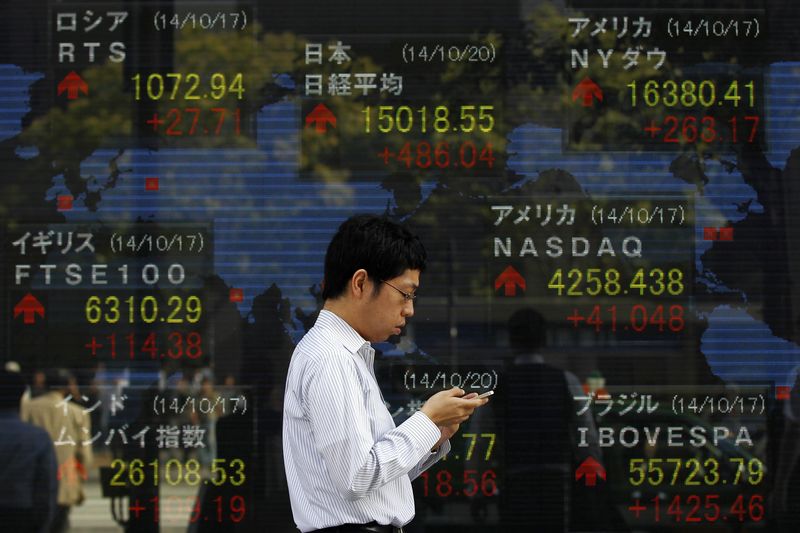S&P 500 falls as ongoing government shutdown, trade jitters weigh
Updates with India open and context on Trump visa order; adds Berkshire-BYD news
Investing.com-- Asian stocks were a mixed bag on Monday, with Japanese shares rebounding from prior losses despite a hawkish Bank of Japan, while Indian technology stocks slid on U.S. President Donald Trump’s crackdown against a major work visa category.
Chinese stocks lagged, while profit-taking in major internet stocks and losses in BYD weighed on Hong Kong shares.
Regional markets took some positive cues from record-high closes on Wall Street last week, as investors cheered an interest rate cut by the Federal Reserve. But this rally was seen cooling on Monday, with S&P 500 Futures down 0.1% in Asian trade.
Focus this week is on a host of key economic indicators and Fed speakers, with Chair Jerome Powell set to speak on Tuesday.
India’s Nifty 50 flat, tech slides on Trump’s H-1B order
India’s Nifty 50 index opened mildly negative on Monday, pressured chiefly by losses in major tech and outsourcing stocks.
IT majors Tech Mahindra Ltd (NSE:TEML), Tata Consultancy Services Ltd. (NSE:TCS), Infosys Ltd (NSE:INFY), and Wipro Ltd (NSE:WIPR), were the worst performers on the Nifty, losing between 2% and 4%.
The sector was rattled by Trump on Friday imposing a $100,000 annual fee on companies for issuing new H-1B worker visas.
The visa has long served as a means for Indian tech companies to rotate their skilled talent into U.S. projects. The sector is also highly dependent on the U.S. for revenue, earning nearly 60% from overseas projects.
Indian tech has benefited greatly from the outsourcing of U.S.-based labor and operations to cheaper, local businesses. Trump’s increased scrutiny of this practice could herald more headwinds in the coming months.
Trump had last month also doubled tariffs against India to 50% over its buying of Russian oil.
But bigger losses in Indian markets were stemmed by positive comments from Prime Minister Narendra Modi on Sunday. Modi said a recent round of consumer tax cuts enacted by his administration will boost economic growth.
Nikkei surges as BOJ’s hawkish surprise sparks limited weakness
The Nikkei 225 and TOPIX indexes rose 1.5% and 0.9%, respectively, after falling from record highs on Friday.
Losses in Japanese markets were spurred chiefly by the Bank of Japan, which kept interest rates unchanged on Friday, but signaled plans to begin offloading its massive holdings of exchange-traded funds.
The BOJ’s move represents some more monetary tightening, and also heralds selling pressure on stocks most exposed to its ETF holdings, which come largely from the tech and chipmaking sectors.
Still, losses in Japanese markets were stemmed by the BOJ’s planned annual sales representing only a small portion of its overall ETF holdings. BOJ Governor Kazuo Ueda also struck a largely moderate tone on Friday, and did not commit to any potential interest rate hikes.
Samsung boosts KOSPI on reports of Nvidia approval
South Korean stocks also outperformed most of their Asian peers on Monday, with the KOSPI adding 0.9%.
Samsung Electronics Co Ltd (KS:005930) was a major boost to the index, rallying as much as 5% after a host of reports said the company had earned NVIDIA Corporation’s (NASDAQ:NVDA) approval to supply advanced memory chips to the artificial intelligence major.
The approval puts Samsung back in competition with rivals such as SK Hynix Inc (KS:000660) and Micron Technology Inc (NASDAQ:MU) in supplying advanced AI memory chips, which have proven to be an increasingly lucrative sector over the past two years.
Broader Asian markets were a mixed bag. Hong Kong’s Hang Seng index fell for a third straight session from a four-year high, amid sustained profit-taking in local tech names.
BYD (HK:1211) was a major weight on the Hang Seng, losing over 3% on a report that Warren Buffett’s Berkshire Hathaway (NYSE:BRKa) had entirely exited its position in the electric vehicle maker.
China’s Shanghai Shenzhen CSI 300 and Shanghai Composite indexes were flat, showing little reaction to the People’s Bank of China leaving its benchmark loan prime rate unchanged as expected.
Focus is squarely on ongoing trade dialogue between the U.S. and China, with the two reaching consensus on the U.S. operations of TikTok last week.
Australia’s ASX 200 rose 0.4%, while Singapore’s Straits Times index was flat.
